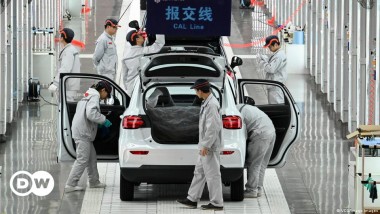From solar to EVs: With China's overproduction and state subsidies, the US and EU are working to ensure that their clean-energy sectors aren't wiped out by unfair competition ( www.dw.com ) Englisch
Beijing's industrial subsidies are on average three to four times higher than in Organisation for Economic Co-operation and Development (OECD) countries — sometimes up to nine times as much. A report published this week by IfW-Kiel estimated that industrial subsidies amounted to €221 billion or 1.73% of China's gross domestic product in 2019. Another study put annual subsidies typically at around 5% of GDP.
The IfW-Kiel report revealed how Chinese subsidies for domestic green-tech firms had increased significantly in 2022. The world's largest EV maker, BYD, received €2.1 billion, compared with €220 million just two years earlier. Support for wind turbine maker Mingyang rose from €20 million to €52 million.
Europe's green-energy sector has already taken a beating from cheap Chinese imports of solar panels, which have wiped out several domestic players and prompted an EU anti-subsidy probe. Though EU countries installed record levels of solar capacity last year — 40% more than in 2022 — the vast majority of panels and parts came from China, according to data from the International Energy Agency.
Analysts argue that China can't succeed without strong and stable markets for its products, which should give US and EU leaders the edge in negotiations with Beijing.
